News
Student Lounge
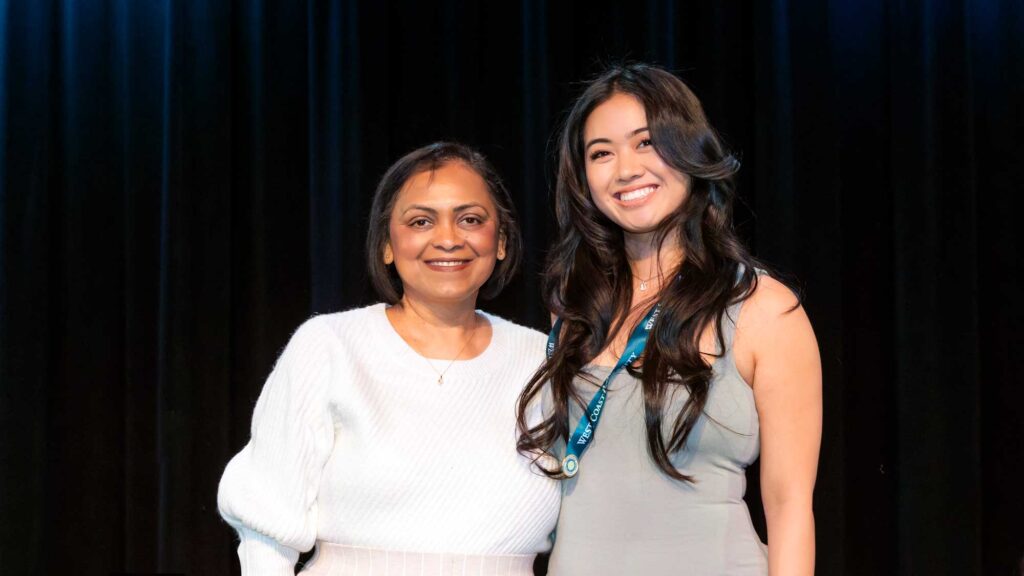
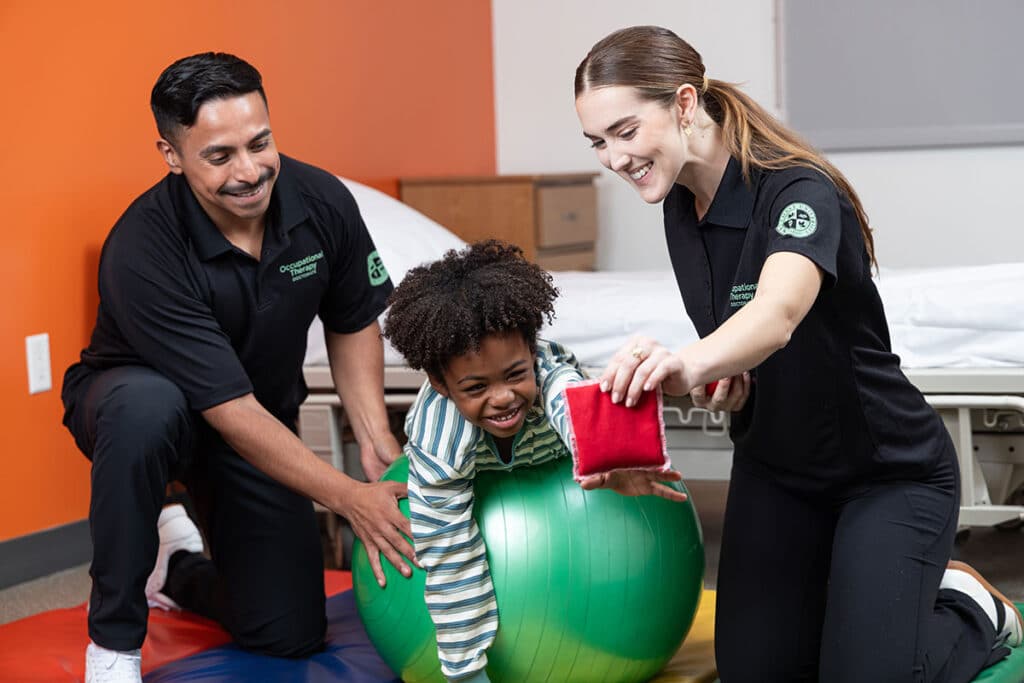

Earn your Doctor of Occupational Therapy degree in 32 months
The Dean’s Scholarship and Community Leader Scholarship are available to new students starting WCU’s OTD program
Students will have 1-2 days per week of online synchronous learning that gives them the ability to engage with their professors and peers in real time
Technologically advanced simulation center that mimics real-life treatment settings
Interprofessional setting where you learn alongside students in other healthcare fields
Dynamic learning environment where you can practice integrated care
One-on-one mentorship with an experienced OT faculty mentor
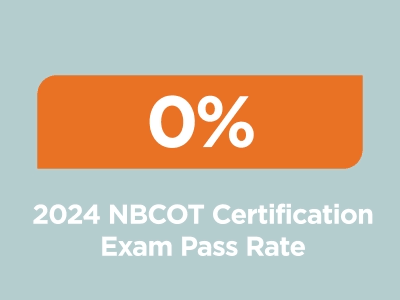
WCU’s Doctor of Occupational Therapy program, one of the leading OTD programs in Los Angeles, is located at the WCU Center for Graduate Studies. Our program helps students develop the skills and competencies needed to enter the field and provide patient-centered care. We take an integrated approach to classroom work and experiential learning.
Our OTD program derives from a practice-scholar model emphasizing the integration of scholarly knowledge in professional practice. Graduates of the program will be prepared to apply principles of evidence-based practice, research, and critical thinking to facilitate the well-being of their OT patients.
If you’re just starting your search for OTD programs, our knowledgeable advisors are here to help! Attend an info session to learn more about the program’s curriculum, requirements, and more.
On-Campus and Online Synchronous Learning
120 Credits
32 Months
8 Trimesters
The Occupational Therapy Doctorate program is offered on a Trimester system, with 3 trimesters a year. Students may complete the OTD program in a total of 8 trimesters over 32 months.
| Core Occupational Therapy Courses | ||
|---|---|---|
| Core Occupational Therapy Courses | ||
| OCC 700s | Professional Electives | 1 |
| OCC 710 | Foundations of Occupational Therapy Practice | 3 |
| OCC 711 | Occupations Across the Lifespan | 2 |
| OCC 712 | Introduction to Fieldwork I | 1 |
| OCC 713 | OT Evaluation and Screening I | 3 |
| OCC 714 | Introduction to Scholarship and Research | 2 |
| OCC 715 | Basic Patient Care Skills | 2 |
| OCC 716 | Integrated Physiology and Anatomy | 5 |
| OCC 720A | Occupational Performance in the Older Adult Population | 5 |
| OCC 720B | Skills Lab: Older Adult | 2 |
| OCC 721 | Fieldwork I – Older Adult | 1 |
| OCC 722 | OT Evaluation and Screening II | 2 |
| OCC 723 | Brain, Behavior and Occupation | 3 |
| OCC 724 | Movement Analysis in Occupation | 3 |
| OCC 725 | Scholarship and Evidence-Based Practice I | 3 |
| OCC 726 | Occupations in Practice | 2 |
| OCC 730 | Introduction to Doctoral Studies | 1 |
| OCC 731A | Occupational Performance in the Adult Population | 5 |
| OCC 731B | Skills Lab: Adult | 2 |
| OCC 732 | Fieldwork I – Adults | 1 |
| OCC 733 | Scholarship and Evidence-Based Practice II | 3 |
| OCC 734 | Preparatory Methods I | 3 |
| OCC 736 | Assistive Technology | 3 |
| OCC 741A | Occupational Performance in the Child and Adolescent Population | 5 |
| OCC 741B | Skills Lab: Children and Adolescents | 2 |
| OCC 742 | Fieldwork I-Children and Adolescents | 1 |
| OCC 743 | Introduction to Fieldwork II | 1 |
| OCC 744 | Preparatory Methods II | 4 |
| OCC 745 | Occupational Wellness | 4 |
| OCC 746 | Leadership and Advancement in Occupational Therapy Practice | 4 |
| OCC 751 | Preparation for Doctoral Professional Practice | 1 |
| OCC 752 | Fieldwork II-A | 12 |
| OCC 761 | Preparation for Capstone I | 1 |
| OCC 762 | Fieldwork IIB | 12 |
| OCC 771 | Preparation for Capstone II | 2 |
| OCC 773 | Doctoral Capstone Experience I | 5 |
| OCC 780 | Doctoral Capstone Experience II | 6 |
| OCC 782 | Capstone | 2 |
| Total Credit Hours: | 120.0 | |
* Professional electives include OCC 737E, OCC 738E, and OCC 739E
We know school is a substantial commitment. At WCU, we want to equip you with all the information you need to make the right decision for your future.
Our goal is to give you a clear understanding of Occupational Therapy Doctorate tuition costs so you can be well-informed as you navigate the application and enrollment process. To assist you in your decision, we provide a breakdown below of the OTD program costs at West Coast University.
We offer several financial aid options — including scholarships, grants, and loan access — to help support you through your studies.
For more information about your financial support options, visit our financial aid page.
Estimated Cost of Attendance is comprised of both direct costs and indirect costs, as outlined in the charts below. The purpose of the Cost of Attendance (COA) is to provide students and families with an estimated cost to attend West Coast University. The COA includes both direct and indirect cost estimates and are categorized as follows: (1) Direct costs are paid directly to West Coast University and are shown separately for each program; (2) Indirect costs are not paid to West Coast University and are estimates students may use to budget expenses they may incur while attending school. While actual indirect costs may vary, West Coast University estimates these amounts based on the number of months in an academic year and whether students will live with parents or off campus.
Direct Costs
| Degree Type | Doctorate (Effective prior to Fall 2025) | Doctorate (Effective Starting Fall 2025) |
| Total Program Credits | 120 | 120 |
| Program Length (Full-Time) | 8 trimesters | 8 trimesters |
| Tuition Cost (per credit) | $919 | $919 |
| Total Tuition Cost | $110,280 | $110,280 |
| Application Fee (non-refundable) | $0 | $0 |
| STRF1 (non-refundable) | $0 | $0 |
| Estimated Total Book Costs3 | $3,570 | $3,693 |
| Estimated Total Book Shipping Cost2 | $357 | $369 |
| Estimated for Uniforms Fees2 | $75 | $75 |
| Estimate for Supplies & Licensure Preparation Fees2 | $70 | $70 |
| Technology Fee3($150 per trimester) | $1,200 | $1,200 |
| Estimated Total Program Costs (Texas) | $115,552 | $115,687 |
Indirect Costs
| 8 Month Academic Year4 | ||||
| Prior to Fall 1 2025 | Starting Fall 1 2025 | |||
| with parents | off campus | with parents | off campus | |
| Federal Student Loan Fees | $220 | $220 | $220 | $220 |
| Course Materials (Personal Electronic Device-1st year only) | $1,000 | $1,000 | $1,000 | $1,000 |
| Professional License, Certificate, or First Professional Credential | $270 | $270 | $270 | $270 |
| Living Expenses (Food & Housing) | $3,728 | $12,432 | $3,904 | $13,024 |
| Transportation | $2,584 | $2,584 | $2,656 | $2,656 |
| Miscellaneous Personal Expenses | $8,448 | $8,448 | $8,448 | $8,448 |
| Total | $16,250 | $24,954 | $16,250 | $24,954 |
1 Effective April 1, 2024, the Student Tuition Recovery Fund (STRF) assessment rate will be zero dollars and zero cents ($0.00) per one thousand dollars ($1,000) of institutional charges.
The State of California established the Student Tuition Recovery Fund (STRF) to relieve or mitigate economic loss suffered by a student in an educational program at a qualifying institution, who is or was a California resident while enrolled, or was enrolled in a residency program, if the student enrolled in the institution, prepaid tuition, and suffered an economic loss. Unless relieved of the obligation to do so, you must pay the state-imposed assessment for the STRF, or it must be paid on your behalf, if you are a student in an educational program, who is a California resident, or are enrolled in a residency program, and prepay all or part of your tuition.
You are not eligible for protection from the STRF and you are not required to pay the STRF assessment, if you are not a California resident, or are not enrolled in a residency program.
It is important that you keep copies of your enrollment agreement, financial aid documents, receipts, or any other information that documents the amount paid to the school. Questions regarding the STRF may be directed to the Bureau for Private Postsecondary Education, 1747 N. Market Blvd. Ste 225 Sacramento, CA 95834, (916) 431-6959 or (888) 370-7589.
To be eligible for STRF, you must be a California resident or enrolled in a residency program, prepaid tuition, paid or deemed to have paid the STRF assessment, and suffered an economic loss as a result of any of the following:
To qualify for STRF reimbursement, the application must be received within four (4) years from the date of the action or event that made the student eligible for recovery from STRF.
A student whose loan is revived by a loan holder or debt collector after a period of noncollection may, at any time, file a written application for recovery from STRF for the debt that would have otherwise been eligible for recovery. If it has been more than four (4) years since the action or event that made the student eligible, the student must have filed a written application for recovery within the original four (4) year period, unless the period has been extended by another act of law.
However, no claim can be paid to any student without a social security number or a taxpayer identification number.
2The Estimate for Book, Program Attire, and Supply fees reflect the Manufacturer’s Suggested Retail Price totals compiled in January 2022 and are subject to change. Supplies become student purchases once issued to student. Students who drop or have been dismissed after supplies have been issued will assume ownership for these items and will not be eligible for refunds. For details on all of the supplies, contact the Student Accounts Office.
Fees do not include indirect costs, which may include but are not limited to background checks, health screenings/requirements for clinical, out of state fieldwork placements, and/or transportation.
Refer to the Program Fee Schedule for a breakdown of expected indirect costs.
3 Technology Fee includes student technical support, Office 365, blended and online course delivery/learning management system, mobile app, student portal technology and access, and required electronic course materials/software.
Note 1: Students who wish to take Challenge Exams will be subject to a fee of $100 for each Challenge exam. Please see the campus Bursar Office for a full price listing.
Note 2: Course Audit Policy – Students auditing a course are not charged tuition or fees for the audited course. However, if a student enrolls in both an audit course and a credit-bearing course in the same semester/trimester, they will be responsible for the tuition and applicable fees associated with the credit-bearing course.
Note 3: Applicants are conditionally accepted to the Occupational Therapy Doctorate program until a non-refundable $250.00 good faith payment for a Seat Deposit has been submitted. The Seat Deposit is not a separate charge but will be credited to the program costs should the student not cancel their enrollment. The University will retain the full amount of this deposit should the student cancel their enrollment at any time, for any reason. Seat Deposits may be paid by credit card, debit card, money order, or cashier’s check made payable to West Coast University. A Seat Deposit will be collected for each enrollment and cannot be applied to or carried over to enrollments for other programs or start terms. At their discretion, the Executive Director may refund the full Seat Deposit for unusual or unexpected circumstances that would warrant a full refund.
Student applying for admission to the OTD program at West Coast University must:
Program specific application requirements and prerequisites:
The University reserves the right to deny admission to applicants if the admissions requirements are not successfully met. The denial of admissions is final and may not be appealed.
Required prerequisite courses:
To view a full list of program requirements, please visit our catalog.
Academic terms begin in Spring, Summer, and Fall. To see a list of term start and completion dates, view the Academic Calendar.
West Coast University prepares MSOT and OTD students to be successful professionals, by emphasizing holistic client-centered care, evidence-based practice, and critical thinking skills. A part of our mission at West Coast University is to embrace a student-centric learning partnership. We continuously pursue more effective and innovative ways through which our students develop the competencies and confidence required in a complex and changing world.
Our facility is technologically advanced and provides students with an environment that promotes innovative learning methods designed to develop skilled, confident, and competent therapists. Our faculty members represent a wide array of expertise in the field of occupational therapy.
We are a family here at West Coast University. As you step through our doors, you will feel a comfortable and supportive environment. We provide a quality education for our students. We are a tight-knit group and believe that it’s ok to have fun while you learn.
Our legacy is our graduates. They make us proud daily, as they continue to propel the profession forward as leaders, advocates, and trailblazers, exhibiting industry-current solutions to promote quality of life.
Thank you for your interest in our OTD program. I look forward to meeting you during our interview season.
Warmest regards,
Stacey Willis, OTD, BSOT, OTR/L
Dean & Program Director,
Doctorate of Occupational Therapy Program at WCU
We offer two scholarship opportunities to help you pursue your occupational therapy degree. The Dean’s Scholarship and Community Leader Scholarship are available to new students enrolling in WCU’s Master of Science in Occupational Therapy or Occupational Therapy Doctorate programs.
Visit WCU’s online catalog to read more about available scholarships and their eligibility requirements.
Upon successful completion of the Occupational Therapy Doctorate program, students will be able to:
The OTD Student Handbook is designed to help you navigate through your time in our program. The handbook provides an overview of academic standards, policies and procedures, student resources, and expected behaviors — all in a single location.
WCU OT Student Handbook, please click here.
WCU OT Fieldwork Education Manual, please click here.
NBCOT Certification data for the program is available at the NBCOT website.
Graduates of West Coast University’s Occupational Therapy Doctorate program are eligible to take the national certification examination for the occupational therapist. The National Board for Certification in Occupational Therapy (NBCOT) administers the exam. Once a graduate completes the examination, he or she will be an Occupational Therapist, Registered (OTR). In most states, licensure is required for practice, and state licenses are typically based on the results of the NBCOT certification examination.
Please note that individuals taking the national certification examination must answer the following questions:
Graduation & NBCOT Pass Rates
Graduates from the Occupational Therapy Doctorate program are eligible to sit for the national certification examination for the occupational therapist administered by the National Board for Certification in Occupational Therapy (NBCOT). Graduation and NBCOT pass rates are as follows:
Graduation Data
| Year | Students Entering/Graduating | Withdrawal or non-academic reasons | Graduation Rate |
|---|---|---|---|
| Year | Students Enter/Grad | Withdrawal or non-academic reasons | Grad Rate |
| 2023 | 34/33 | – | 97% |
| 2024 | 32/32 | – | 100% |
| 2025 | 33/30 | 2** | *97% |
| Total | 99/95 | 2** | 98% |
**Students who withdrew, or did not graduate with the entering cohort, for reasons other than academic performance
*The graduation rate excludes non-academic withdrawals and graduates who completed the program outside the published timeframe, per ACOTE guidelines.
NBCOT Certification Data
| Year | Number of Students Taking Exam | Number of Students Who Passed Exam | Passage Rate |
|---|---|---|---|
| Year | Num. of Students Taking Exam | Num. of Students Who Passed Exam | Passage Rate |
| 2022 | 31 | 31 | 100% |
| 2023 | 26 | 23 | 88% |
| 2024 | 33 | 30 | 91% |
| Information Sessions | To view available dates and reserve your virtual seat, click here! |
| Campus Tours | Available every Thursday at 4pm. Campus Address: 590 N Vermont Ave. Los Angeles, CA 90004 |
Going beyond the generalist requirements of a master’s level program, the doctoral coursework at West Coast University prepares the student as a scholar of practice by preparing them for future leadership and advocacy within occupational therapy and the workplace.
The purpose of the capstone project is to serve as the culminating project for the doctoral student. The capstone enables the student to see a large project through the phases of initial research and development, implementation, evaluation, and dissemination.
Capstone projects will focus on one or more of the following areas:
The Doctoral Capstone Experience serves as the context for implementing the capstone project. The DCE site provides the student with the opportunity to develop advanced skills beyond the level of a generalist practitioner, deepen competency as a scholar of practice, and complete their capstone project.
The Doctoral Capstone Experience is 14 weeks (560 hours), and 80% of the DCE hours must be completed directly on-site.
View capstone projects completed by previous students.
West Coast University prepares MSOT and OTD students to be successful professionals, by emphasizing holistic client-centered care, evidence-based practice, and critical thinking skills. A part of our mission at West Coast University is to embrace a student-centric learning partnership. We continuously pursue more effective and innovative ways through which our students develop the competencies and confidence required in a complex and changing world.
Our facility is technologically advanced and provides students with an environment that promotes innovative learning methods designed to develop skilled, confident, and competent therapists. Our faculty members represent a wide array of expertise in the field of occupational therapy.
We are a family here at West Coast University. As you step through our doors, you will feel a comfortable and supportive environment. We provide a quality education for our students. We are a tight-knit group and believe that it’s ok to have fun while you learn.
Our legacy is our graduates. They make us proud daily, as they continue to propel the profession forward as leaders, advocates, and trailblazers, exhibiting industry-current solutions to promote quality of life.
Thank you for your interest in our OTD program. I look forward to meeting you during our interview season.
Warmest regards,
Stacey Willis, OTD, BSOT, OTR/L
Dean & Program Director,
Doctorate of Occupational Therapy Program at WCU
We offer two scholarship opportunities to help you pursue your occupational therapy degree. The Dean’s Scholarship and Community Leader Scholarship are available to new students enrolling in WCU’s Master of Science in Occupational Therapy or Occupational Therapy Doctorate programs.
Visit WCU’s online catalog to read more about available scholarships and their eligibility requirements.
Upon successful completion of the Occupational Therapy Doctorate program, students will be able to:
The OTD Student Handbook is designed to help you navigate through your time in our program. The handbook provides an overview of academic standards, policies and procedures, student resources, and expected behaviors — all in a single location.
WCU OT Student Handbook, please click here.
WCU OT Fieldwork Education Manual, please click here.
NBCOT Certification data for the program is available at the NBCOT website.
Graduates of West Coast University’s Occupational Therapy Doctorate program are eligible to take the national certification examination for the occupational therapist. The National Board for Certification in Occupational Therapy (NBCOT) administers the exam. Once a graduate completes the examination, he or she will be an Occupational Therapist, Registered (OTR). In most states, licensure is required for practice, and state licenses are typically based on the results of the NBCOT certification examination.
Please note that individuals taking the national certification examination must answer the following questions:
Graduation & NBCOT Pass Rates
Graduates from the Occupational Therapy Doctorate program are eligible to sit for the national certification examination for the occupational therapist administered by the National Board for Certification in Occupational Therapy (NBCOT). Graduation and NBCOT pass rates are as follows:
Graduation Data
| Year | Students Entering/Graduating | Withdrawal or non-academic reasons | Graduation Rate |
|---|---|---|---|
| Year | Students Enter/Grad | Withdrawal or non-academic reasons | Grad Rate |
| 2023 | 34/33 | – | 97% |
| 2024 | 32/32 | – | 100% |
| 2025 | 33/30 | 2** | *97% |
| Total | 99/95 | 2** | 98% |
**Students who withdrew, or did not graduate with the entering cohort, for reasons other than academic performance
*The graduation rate excludes non-academic withdrawals and graduates who completed the program outside the published timeframe, per ACOTE guidelines.
NBCOT Certification Data
| Year | Number of Students Taking Exam | Number of Students Who Passed Exam | Passage Rate |
|---|---|---|---|
| Year | Num. of Students Taking Exam | Num. of Students Who Passed Exam | Passage Rate |
| 2022 | 31 | 31 | 100% |
| 2023 | 26 | 23 | 88% |
| 2024 | 33 | 30 | 91% |
| Information Sessions | To view available dates and reserve your virtual seat, click here! |
| Campus Tours | Available every Thursday at 4pm. Campus Address: 590 N Vermont Ave. Los Angeles, CA 90004 |
Going beyond the generalist requirements of a master’s level program, the doctoral coursework at West Coast University prepares the student as a scholar of practice by preparing them for future leadership and advocacy within occupational therapy and the workplace.
The purpose of the capstone project is to serve as the culminating project for the doctoral student. The capstone enables the student to see a large project through the phases of initial research and development, implementation, evaluation, and dissemination.
Capstone projects will focus on one or more of the following areas:
The Doctoral Capstone Experience serves as the context for implementing the capstone project. The DCE site provides the student with the opportunity to develop advanced skills beyond the level of a generalist practitioner, deepen competency as a scholar of practice, and complete their capstone project.
The Doctoral Capstone Experience is 14 weeks (560 hours), and 80% of the DCE hours must be completed directly on-site.
View capstone projects completed by previous students.

Our OTD students get one-on-one support through every step of their job search. Our dedicated Career Services team can help with anything from resume writing to interview coaching.1
Additionally, OTD students are matched with an occupational therapy faculty mentor from day one of their education, giving them the ability to get continuous professional guidance and learn about the different environments and fields where they could practice as occupational therapists.
Occupational therapists can work in a variety of settings and specialties. According to the U.S. Bureau of Labor Statistics, occupational therapists most often work in:
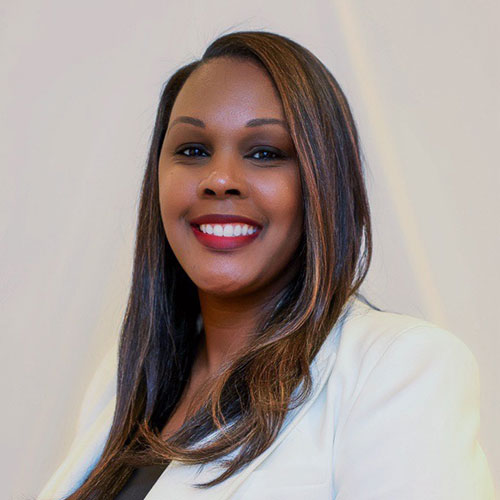
Dr. Stacey Willis obtained her doctorate degree in occupational therapy from the University of Southern California in 2012, and her undergraduate degree in occupational therapy from California State University Dominguez Hills in 2002. Dr. Willis is an expert in psychosocial occupational therapy treatment and has been working in community-based mental health for the past 12 years. She has extensive experience in the areas of management, leadership, program development, community integration, fiscal operations, and contract administration.
Dr. Willis served as the Intensive Services Director at the Occupational Therapy Training Program, where she was responsible for overseeing all daily and administrative operations of the Intensive Services Department. This included the oversight of three intensive programs funded by the county of Los Angeles (Wraparound Program, Center for the Assessment of Prodromal States Pilot Program, and the Full Service Partnership Program). Dr. Willis was able to identify, promote, and embed occupational therapy services into various community-based programs. As director, she also provided ongoing management, training, and mentorship to an interdisciplinary mental health services team. She remains a consultant for the division.
Dr. Willis has spoken at numerous conferences and community events emphasizing the importance and vital role that occupational therapy provides in the treatment of individuals living with mental illness. Her insights have contributed to the development of OTD programs within her local community.
Dr. Willis is an avid Lakers fan and self-proclaimed movie buff, and she enjoys engaging in community outreach in an effort to inspire youth to reach their fullest potential. Her and her husband’s favorite pastime is to cheer on their son and daughter at their numerous sporting events.
Meet the OT Dean | Watch Video

NBCOT Certification data for the program is available at the NBCOT website.

West Coast University’s Doctor of Occupational Therapy program received accreditation on July 26, 2019 from the Accreditation Council for Occupational Therapy Education (ACOTE) of the American Occupational Therapy Association (AOTA), located at 7501 Wisconsin Avenue, Suite 510E Bethesda, MD 20814. ACOTE’s telephone number is 301-652-6611, and their website is Acoteonline.org.
Program graduates will be eligible to sit for the national certification examination for the occupational therapist administered by the National Board for Certification in Occupational Therapy (NBCOT). After successful completion of this exam, the individual will be an Occupational Therapist, Registered (OTR). In addition, most states require licensure to practice; however, state licensure is usually based on the results of the NBCOT Certification Examination. A felony conviction may affect a graduate’s ability to sit for the NBCOT certification examination or attain state licensure.
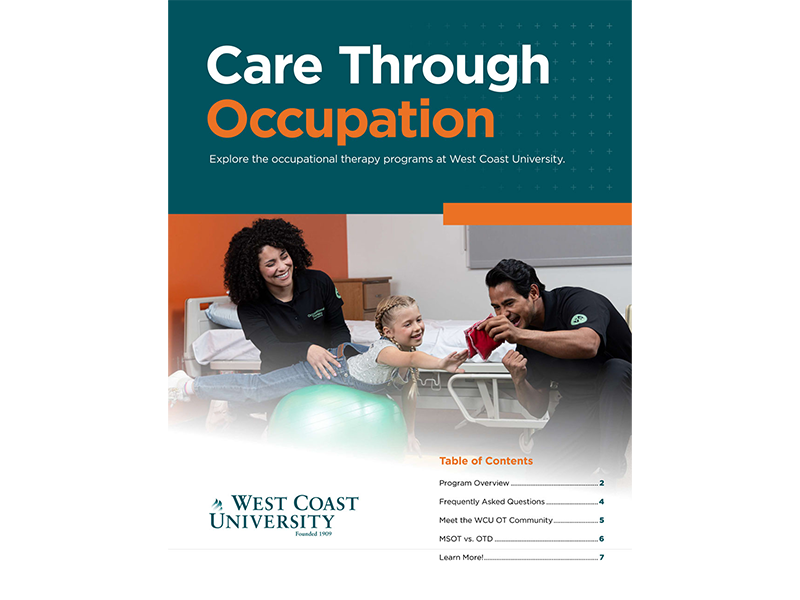
Curious to learn more about WCU’s occupational therapy programs? This easy-to-read brochure includes essential information such as:
Download the brochure to explore our occupational therapy graduate program and take the next step toward a rewarding future in healthcare.
An occupational therapy doctorate (OTD) is the most advanced degree you can pursue in occupational therapy. WCU’s OTD program helps provide you with the hands-on experience and skill set needed to succeed as a Doctor of Occupational Therapy.
WCU’s OTD program is based in the practice-scholar model, which focuses on the integration of scholarly knowledge in professional practice. Going beyond the generalist requirements of a master’s-level program, the doctoral coursework for WCU’s OTD program provides the student with a deepened engagement with practice skills, innovation, occupational therapy and occupational science theory, and research, thereby building a solid foundation for future leadership and advocacy within occupational therapy and the workplace.
With WCU’s OTD program, you can earn your degree in 32 months, which is 8 trimesters.
No, we do not require your GRE scores. Please do not send them as these scores will not be taken into account for our admissions decision.
Yes, as long as you meet the minimum 6-semester unit requirement, including labs. To meet both our anatomy and physiology prerequisite requirements, you can submit two single courses (i.e., Human Anatomy + lab and Human Physiology + lab) or two combination courses (i.e., A&P1 and A&P2).
Yes, but only if you are going to have the coursework and all admissions requirements completed and submitted by the deadline. Coursework must be verified by OTCAS by the deadline in order to be reviewed/accepted.
WCU’s Occupational Therapy Doctorate program starts in the fall of each year.
No, please do not send in a resume or personal statement. This is not part of the application process.
Our program admissions requirements are based on semester units.
Center for Graduate Studies
590 North Vermont Avenue
Los Angeles, CA 90004
(323) 284-7998
Financial aid and scholarships are available for those who qualify.